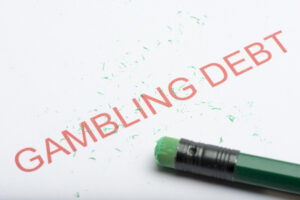Contents

Gambling debt can be successfully discharged in bankruptcy in Michigan.
Bankruptcy is a legal process that allows individuals or businesses to discharge their debts and start fresh. However, not all debts are dischargeable under bankruptcy law, including gambling debts incurred within a certain timeframe before filing for bankruptcy. In a recent decision, the Sixth Circuit Court of Appeals provided some guidance on how gambling debts can be treated in a bankruptcy case. In this blog post, we will explore the court’s opinion In re Rembert, and how it can help with gambling debt in a bankruptcy case.
Background of In Re Rembert
In Re Rembert, the debtor filed for Chapter 7 bankruptcy and sought to discharge her gambling debts. The bankruptcy court denied the discharge, finding that the debtor had engaged in fraud by intentionally incurring the gambling debts with no intention of paying them back. The debtor appealed to the district court, which reversed the bankruptcy court’s decision. The creditor then appealed to the Sixth Circuit Court of Appeals.
The Sixth Circuit’s Opinion
The Sixth Circuit reversed the lower District courts’ decision and held that the debtor’s gambling debts were dischargeable in bankruptcy. The court reasoned that the debtor did not engage in fraud by incurring the gambling debts. The court noted that the debtor had a gambling addiction and that she did not intend to defraud her creditors when she incurred the debts. The court also held that the debtor’s gambling activity was not illegal, and there was no evidence that the debtor had committed any crimes in connection with his gambling activity.
The court further held that the debtor’s gambling activity was not “willful and malicious” under bankruptcy law, which would have made the debts nondischargeable. The court found that the debtor did not engage in any deliberate or intentional misconduct that would constitute “willful and malicious” conduct under the law. The court also noted that the debtor’s gambling activity did not cause any harm to her creditors because the debts were unsecured and the creditors had voluntarily extended credit to the debtor.
Implications for Bankruptcy Cases Involving Gambling Debts
The Sixth Circuit’s opinion in Re Rembert provides some important guidance for bankruptcy cases involving gambling debts. First, the court’s decision makes clear that not all gambling debts are nondischargeable in bankruptcy. To be nondischargeable, the debts must have been incurred through illegal activity, fraud, or willful and malicious conduct. In cases where the debts were incurred due to a gambling addiction or without any intent to defraud creditors, the debts may be dischargeable.
Second, the court’s decision emphasizes the importance of considering the debtor’s intent and conduct when determining whether gambling debts are dischargeable. In cases where the debtor engaged in illegal or fraudulent activity, or willful and malicious conduct, the debts may be nondischargeable. However, where the debtor’s gambling activity was not illegal or fraudulent and did not cause harm to creditors, the debts may be dischargeable.
Conclusion
Bankruptcy can be a complex and challenging process, particularly when dealing with debts arising from gambling activity. However, the Sixth Circuit’s opinion in Re Rembert provides some helpful guidance on how gambling debts can be treated in a bankruptcy case. By considering the debtor’s intent and conduct, bankruptcy courts can determine whether gambling debts are dischargeable or nondischargeable, which can help debtors get a fresh start and move forward with their lives.




